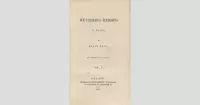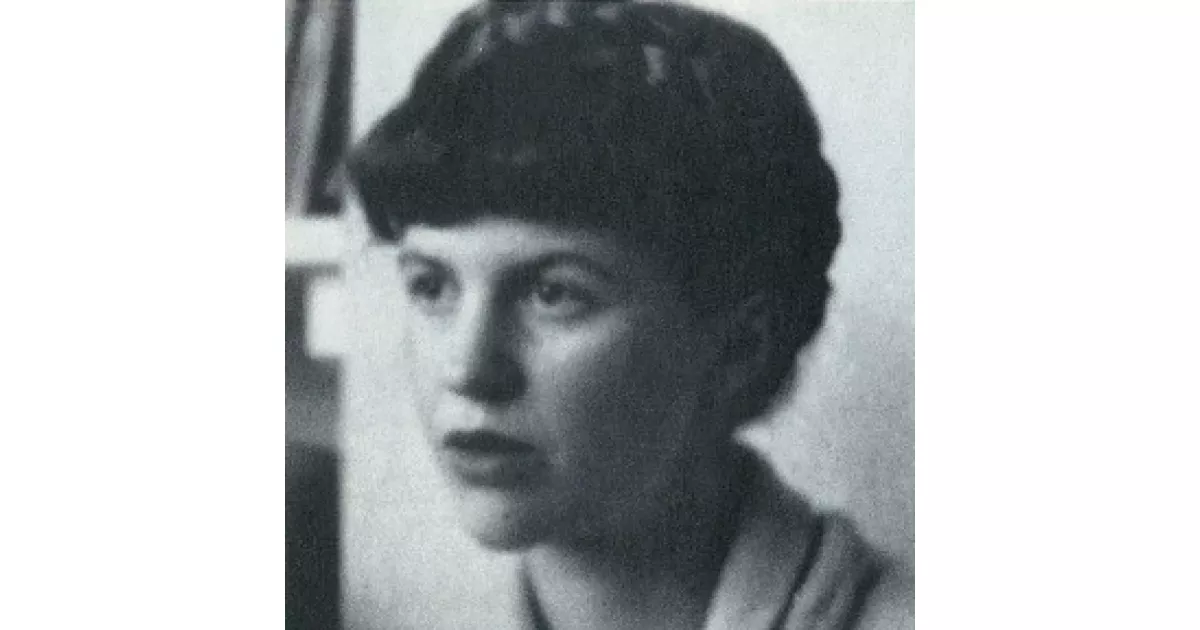Sylvia Plath was an American poet, novelist, and short story writer known for her contributions to confessional poetry. Her most famous works include "The Colossus and Other Poems", "Ariel", and the semi-autobiographical novel "The Bell Jar", published shortly before her death in 1963. Posthumously, her "Collected Poems" (1981) earned her a Pulitzer Prize in Poetry in 1982, making her the fourth poet to receive this award after death.
1906: Birth of Aurelia Schober Plath
Sylvia Plath's mother, Aurelia Schober Plath, was born in 1906.
1907: N/A
This date is not associated with a specific event in Sylvia Plath's life.
1920: The Schobers' Move to Point Shirley
In 1920, Sylvia Plath's maternal grandparents, the Schobers, moved to Point Shirley.
October 27, 1932: Sylvia Plath's Birth
Sylvia Plath was born on October 27, 1932 in Boston, Massachusetts.
1934: Publication of Otto Plath's Book on Bumblebees
In 1934, Sylvia Plath's father, Otto Plath, published a book about bumblebees.
April 27, 1935: Birth of Warren Plath
Sylvia Plath's brother, Warren Plath, was born on April 27, 1935.
1936: Relocation to Winthrop, Massachusetts
In 1936, the Plath family moved to Winthrop, Massachusetts.
November 5, 1940: Death of Otto Plath
On November 5, 1940, Otto Plath died from complications following the amputation of his foot due to untreated diabetes.
1940: Death of Otto Plath
Sylvia Plath's father, Otto Plath, died in 1940.
1942: Relocation to Wellesley, Massachusetts
In 1942, following Otto Plath's death, Sylvia Plath and her family moved to Wellesley, Massachusetts.
1947: Scholastic Art & Writing Award
Sylvia Plath won an award for her paintings from the Scholastic Art & Writing Awards in 1947.
1950: Enrollment at Smith College
Sylvia Plath enrolled at Smith College, a private women's liberal arts college in Massachusetts, in 1950.
1950: Graduation from Bradford Senior High School and First National Publication
Sylvia Plath graduated from Bradford Senior High School, now Wellesley High School, in 1950. That same year, she had her first national publication in "The Christian Science Monitor".
August 24, 1953: First Documented Suicide Attempt
On August 24, 1953, Sylvia Plath made her first medically documented suicide attempt. This followed a period of instability and disappointment, including a missed meeting with Dylan Thomas and rejection from a Harvard writing seminar.
January 1955: Submission of Thesis at Smith College
Sylvia Plath submitted her thesis, "The Magic Mirror: A Study of the Double in Two of Dostoyevsky's Novels," to Smith College in January 1955.
Feb 1955: Plath Expresses Her Passion for Writing
In February 1955, Sylvia Plath wrote a letter to her mother expressing her dedication to writing and her disinterest in pursuing a secretarial career.
1955: Graduation from Smith College
Sylvia Plath graduated from Smith College in 1955, marking a significant milestone in her life. Her exceptional writing talents earned her numerous awards and recognition during her time there, including the prestigious Glascock Prize.
February 25, 1956: Meeting Ted Hughes
Sylvia Plath met poet Ted Hughes on February 25, 1956.
June 16, 1956: Marriage to Ted Hughes
Sylvia Plath and Ted Hughes married on June 16, 1956, at St George the Martyr, Holborn.
1956: Marriage to Ted Hughes
Sylvia Plath married fellow poet Ted Hughes in 1956.
June 1957: Move to the United States and Teaching Position at Smith College
Sylvia Plath and Ted Hughes moved to the United States in June 1957, and Plath began teaching at Smith College.
1958: Move to Boston and Various Jobs
In 1958, Sylvia Plath and Ted Hughes moved to Boston. Plath took a job as a receptionist at Massachusetts General Hospital and attended creative writing seminars led by Robert Lowell.
December 1959: Move to London
Sylvia Plath and Ted Hughes moved back to England in December 1959, residing in London.
1959: Early Influences and Development of Plath's Poetic Style
In her early poems, Sylvia Plath experimented with various themes and styles, drawing inspiration from poets like Dylan Thomas and W.B. Yeats. While at the Yaddo writers' colony in 1959, she wrote "Poem for a Birthday," reflecting on her personal struggles and marking a shift towards more confessional poetry.
1959: Stay at Yaddo Artist Colony
Sylvia Plath and Ted Hughes stayed at the Yaddo artist colony in Saratoga Springs, New York, in late 1959.
April 1, 1960: Birth of Frieda Hughes
Sylvia Plath and Ted Hughes's daughter, Frieda Hughes, was born on April 1, 1960.
1960: Shift Towards Darker Themes and Exploration of Personal Trauma
After 1960, Plath's poetry took on a darker and more surreal tone, influenced by her personal experiences and a growing sense of mortality. Her work explored themes of death, trauma, and the complexities of familial relationships.
1960: Early Literary Recognition
By 1960, Sylvia Plath had already garnered significant recognition in the literary world. Her work had been featured in prominent publications like Harper's, The Spectator, and The Times Literary Supplement, and she was a contender for the prestigious Yale Younger Poets prize, solidifying her status as a poet of note.
1960: Publication of "The Colossus and Other Poems"
In 1960, Sylvia Plath published her first collection of poetry, "The Colossus and Other Poems".
February 1961: Miscarriage and Marital Discord
In February 1961, Sylvia Plath tragically experienced a miscarriage, an event that deeply affected her and found expression in her poetry, notably in "Parliament Hill Fields." This period was also marked by serious marital problems, as Plath revealed in a letter that her husband, Ted Hughes, had physically abused her just days before the miscarriage.
August 1961: Meeting Assia Wevill
A fateful encounter occurred in August 1961 when Sylvia Plath and Ted Hughes rented their flat to Assia and David Wevill. This meeting marked the beginning of a complex and ultimately destructive relationship between Hughes and Assia.
September 1961: Publication of "Wuthering Heights"
In September 1961, Sylvia Plath published her poem "Wuthering Heights," inspired by the Emily Brontë novel. While sharing the title, Plath's poem offered her unique perspective on the Yorkshire moors and showcased her talent for capturing the essence of landscapes in her work.
1961: BBC Interview
In 1961, Sylvia Plath described her first meeting with Ted Hughes during a BBC interview, now held by the British Library Sound Archive.
January 1962: Birth of Nicholas Hughes
Bringing a moment of joy amidst a turbulent period, Sylvia Plath gave birth to her son, Nicholas Hughes, in January 1962.
June 1962: Car Accident and Deteriorating Marriage
Sylvia Plath was involved in a car accident in June 1962, an event she later described as a suicide attempt, highlighting her growing despair. This period saw her marriage further deteriorate following the discovery of Ted Hughes' affair with Assia Wevill.
June 1962: A Suicide Attempt
Sylvia Plath's struggles with mental health reached a crisis point in June 1962 when she attempted to take her own life by driving her car into a river. This event underscored the severity of her depression and the immense pain she was grappling with.
July 1962: Discovery of Ted Hughes' Affair
Sylvia Plath's world was shaken in July 1962 when she discovered her husband's infidelity with Assia Wevill, leading to a separation in September and further fueling her emotional turmoil.
October 12, 1962: Plath Writes "Ariel"
Sylvia Plath wrote the poem "Ariel" on October 12, 1962.
October 1962: A Burst of Creativity
Despite the immense personal challenges she faced, October 1962 marked a period of intense creative output for Sylvia Plath. She penned a significant portion of her most acclaimed poems during this time, including much of her posthumously published collection "Ariel," demonstrating her resilience and extraordinary talent.
December 1962: Return to London and a New Home
December 1962 saw Sylvia Plath return to London with her children, taking residence at 23 Fitzroy Road. This house, once inhabited by William Butler Yeats, held a sense of hope and literary significance for Plath.
1962: BBC Documentary Features Sylvia Plath's Voice
In 1962, a BBC documentary about Sylvia Plath's life aired in London, featuring recordings of her voice.
1962: Separation from Ted Hughes
Sylvia Plath and Ted Hughes separated in 1962.
1962: A Bitterly Cold Winter
The winter of 1962-1963, one of the harshest in a century, brought additional hardship to Sylvia Plath's life. The freezing conditions in her London flat, coupled with her children's illnesses and lack of basic amenities like a telephone, compounded her struggles with depression.
1962: Mixed Reviews for "The Colossus" in America
While Sylvia Plath's debut poetry collection, "The Colossus and Other Poems," was generally well-received in the UK, it garnered more mixed reviews upon its US release in 1962. Some critics, while acknowledging her technical abilities, found her work to be derivative of other poets, failing to fully grasp the groundbreaking nature of her voice.
January 1963: Publication of The Bell Jar
In January 1963, Sylvia Plath's only novel, "The Bell Jar," was published under the pseudonym Victoria Lucas. Although the novel, drawing heavily from her own experiences, would later become a seminal work, it was met with a muted critical response at the time.
January 1963: Seeking Medical Help
In a desperate attempt to alleviate her suffering, Sylvia Plath reached out to her doctor, John Horder, in January 1963, detailing the debilitating effects of her severe depression. Despite maintaining a facade of normalcy, she was battling insomnia, weight loss, suicidal thoughts, and an overwhelming sense of despair.
February 1, 1963: Plath Writes "Kindness"
Sylvia Plath penned the poem "Kindness" on February 1, 1963.
February 11, 1963: Sylvia Plath's Death
Sylvia Plath died on February 11, 1963.
1963: Plath Begins "Double Exposure"
After the publication of "The Bell Jar" in 1963, Sylvia Plath began working on a new literary project titled "Double Exposure."
1963: Death by Suicide
Sylvia Plath died by suicide in 1963 after struggling with depression for much of her adult life.
1963: Publication of "The Bell Jar"
Sylvia Plath's semi-autobiographical novel, "The Bell Jar," was published in 1963.
1965: Posthumous Publication of "Ariel"
"Ariel", a collection of Sylvia Plath's poetry, was published posthumously in 1965.
1965: Enduring Legacy of "Ariel"
Published posthumously in 1965, Sylvia Plath's "Ariel" secured her enduring legacy as one of the most influential poets of her generation. The collection's raw emotion, confessional style, and unflinching exploration of dark themes resonated deeply with readers and continue to captivate audiences today.
1965: "Ariel": A Literary Sensation and Posthumous Recognition
The publication of Sylvia Plath's "Ariel" in 1965 catapulted her to literary fame, but tragically after her death. Critics and readers alike were captivated by the collection's raw emotion, confessional style, and exploration of dark and personal themes. Her tragic suicide amplified the impact of her work, cementing her status as a major literary figure of the 20th century. "Ariel" continues to be recognized for its power and influence, frequently appearing on lists of the best modern poetry collections.
1966: Posthumous Publication of "Ariel" in the US
A year after its UK release, Sylvia Plath's influential poetry collection "Ariel" was published in the United States in 1966, further amplifying her voice and impact on the literary world.
1966: "Ariel" and the Rise of Feminism
When "Ariel" was published in the United States in 1966, it resonated deeply with the emerging feminist movement. Plath's raw and honest portrayal of female rage, ambition, and grief struck a chord with women who saw their own experiences reflected in her work. This led to Plath becoming an icon of the feminist movement, her work seen as a powerful voice for women's experiences.
1969: Vandalism of Plath's Gravestone and Accusations Against Hughes
Following the death of Ted Hughes' mistress, Assia Wevill, and their daughter in 1969, Sylvia Plath's gravestone became a site of repeated vandalism. The name "Hughes" was repeatedly removed, reflecting the growing sentiment that blamed Hughes for Plath's suicide and accusations of abuse towards both Plath and Wevill.
1970: "The Jailor" and the Feminist Movement
In 1970, Sylvia Plath's poem "The Jailor," which depicts an oppressive husband, was included in Robin Morgan's feminist anthology "Sisterhood Is Powerful." This inclusion solidified Plath's status as an icon for the feminist movement, further intertwining her work with the fight against patriarchal oppression.
1971: US Publication of "The Bell Jar"
"The Bell Jar" was published in the US in 1971, after its initial publication in 1963.
1971: Publication of "Winter Trees" and "Crossing the Water"
In 1971, Sylvia Plath's "Winter Trees" and "Crossing the Water" were published in the UK, featuring previously unpublished poems.
1972: Publication of "The Savage God"
Al Alvarez, a close friend of Sylvia Plath, published his book "The Savage God" in 1972. In this work, he explored the nature of suicide, drawing partly from his experience with Plath and sparking further discussion about her tragic end.
1972: Publication of "Arraignment" and Feminist Backlash Against Hughes
In 1972, feminist poet Robin Morgan published "Arraignment," a poem directly accusing Ted Hughes of abusing and causing Sylvia Plath's death. This poem, along with other feminist writings, fueled a movement that viewed Plath as a symbol of female oppression and Hughes as a villain, leading to threats and further controversy.
1975: Publication of "Letters Home"
Sylvia Plath's letters were published in 1975 in the collection "Letters Home: Correspondence 1950–1963."
1981: Publication of "The Collected Poems"
"The Collected Poems", a compilation of Sylvia Plath's work, including previously unpublished pieces, was published in 1981.
1981: Publication of "The Collected Poems" and Posthumous Pulitzer Prize
Sylvia Plath's "The Collected Poems" was published in 1981. She was posthumously awarded the Pulitzer Prize for Poetry.
1982: Posthumous Pulitzer Prize in Poetry
Sylvia Plath was posthumously awarded the Pulitzer Prize in Poetry in 1982 for "The Collected Poems".
1982: Publication of "The Journals of Sylvia Plath"
Sylvia Plath's adult diaries were published in 1982 as "The Journals of Sylvia Plath."
April 20, 1989: Hughes Defends Himself in "The Place Where Sylvia Plath Should Rest in Peace"
On April 20, 1989, Ted Hughes published an article in The Guardian titled "The Place Where Sylvia Plath Should Rest in Peace." In this article, Hughes defended himself against accusations surrounding Plath's death, arguing that the "Plath Fantasia" had overtaken the truth and that his attempts to correct it were met with resistance.
1993: N/A
This date is not associated with a specific event in Sylvia Plath's life.
1994: Death of Aurelia Schober Plath
Sylvia Plath's mother, Aurelia Schober Plath, died in 1994.
1998: Publication of "Birthday Letters" and Hughes' Response to Controversy
In 1998, Ted Hughes published "Birthday Letters," a collection of poems about his relationship with Sylvia Plath. This publication, released shortly before Hughes' death, was seen as his attempt to provide his perspective on their marriage and Plath's suicide, sparking further debate and analysis. The book became a bestseller and won several prestigious awards.
1998: Hughes Begins Work on Plath's Journals
Ted Hughes began working on a complete publication of Sylvia Plath's journals in 1998.
December 1999: Completion of Editing on Plath's Unabridged Journals
Karen V. Kukil completed editing on Sylvia Plath's unabridged journals in December 1999.
March 2000: Alvarez Expresses Regret
In a poignant BBC interview in March 2000, Al Alvarez, a friend and critic of Sylvia Plath, expressed deep regret for failing to recognize the severity of her depression and offer adequate support during her darkest hours.
2000: Publication of "The Unabridged Journals of Sylvia Plath"
Anchor Books published "The Unabridged Journals of Sylvia Plath" in 2000.
2001: Hughes' Controversial Claim
In 2001, a note written by Ted Hughes to literary critic Keith Sagar surfaced, reigniting controversy surrounding Sylvia Plath's death. In the note, Hughes attributed her suicide partly to a negative reaction to antidepressants prescribed by a doctor unaware of her medical history.
2003: Release of "Sylvia" Biopic and Frieda Hughes' Response
The biopic "Sylvia," starring Gwyneth Paltrow as Sylvia Plath, premiered in 2003. The film drew criticism for its portrayal of Plath and ignited controversy due to its focus on the tragic aspects of her life. Frieda Hughes, Plath's daughter, publicly expressed her anger towards the film and the public's interest in her family's tragedies through her poem "My Mother."
January 16, 2004: "Ariel" Ranked Among Best Modern Poetry Books
On January 16, 2004, "The Independent" newspaper ranked Sylvia Plath's "Ariel" as the 3rd best book of modern poetry.
2006: Discovery and Publication of Plath's Sonnet "Ennui"
In 2006, a previously unpublished sonnet by Sylvia Plath, "Ennui," was discovered and published in the online journal "Blackbird."
March 16, 2009: Tragic Death of Nicholas Hughes
In a heartbreaking echo of his mother's fate, Sylvia Plath's son, Nicholas Hughes, died by suicide on March 16, 2009, in Fairbanks, Alaska, after battling with depression, adding another layer of tragedy to Plath's legacy.
2012: Posthumous Recognition: Postage Stamp and English Heritage Plaque
In 2012, the United States Postal Service issued a postage stamp honoring Sylvia Plath, acknowledging her significant contributions to literature. An English Heritage plaque was also installed at her former residence in London, further solidifying her legacy and cultural impact.
February 11, 2013: Unsealing of Plath's Remaining Journals
Two of Sylvia Plath's journals, sealed by Ted Hughes, were unsealed on February 11, 2013, marking the 50th anniversary of her death.
2013: Plath's Estate and Controversies
In 2013, a collection of Sylvia Plath's papers and journals were scheduled for release, as instructed by her husband, Ted Hughes. Hughes' handling of Plath's estate, including burning her last journal and delaying the release of her works, sparked accusations of control and attempts to shape her narrative.
October 2015: BBC Two Documentary "Ted Hughes: Stronger Than Death"
In October 2015, the BBC Two documentary "Ted Hughes: Stronger Than Death" explored Hughes' life and work, including his complex relationship with Sylvia Plath. The documentary featured audio recordings of Plath reading her poetry and an interview with their daughter, Frieda, offering new insights into their lives and legacies.
2018: The New York Times Overlooked Obituary
In 2018, The New York Times published an obituary for Sylvia Plath as part of their "Overlooked" project, aiming to rectify historical omissions of notable women. This recognition further highlighted Plath's enduring influence and the ongoing reassessment of her place in literary history.
Mentioned in this timeline
The Guardian is a British daily newspaper founded in as...

A car also known as an automobile is a wheeled...

Books are a means of storing information as text or...
Massachusetts officially the Commonwealth of Massachusetts is a state located...
England a constituent country of the United Kingdom occupies roughly...

Wuthering Heights by Emily Bront as Ellis Bell centers on...
Trending

10 months ago Harris Dickinson Joins Beatles Biopic Cast; Four Films Set for April 2028

4 months ago Natalie Portman: Ahsoka Season 2 Theory, Miss Dior Essence, AI Actress Controversy.

7 months ago Jason Day's Outfit Sparks Debate Amidst 'Horrific' Open Championship Performance

9 months ago Koepka and DeChambeau attend Ryder Cup dinner, Bradley sees new side of golf.

Crystal Dunn also known as Crystal Alyssia Soubrier is a prominent figure in American professional soccer She showcases her versatility...

3 months ago Brandi Carlile releases distinct album 'Returning To Myself', explores themes of solitude.
Popular

Thomas Douglas Homan is an American law enforcement officer who...

William Franklin Graham III commonly known as Franklin Graham is...

XXXTentacion born Jahseh Dwayne Ricardo Onfroy was a controversial yet...

Jupiter is the fifth and largest planet from the Sun...

Kristi Noem is an American politician who has served as...

Instagram is a photo and video-sharing social networking service owned...
